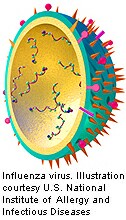Naturally occurring cross protective T cells provide protection in PCR-confirmed influenza
THURSDAY, April 16, 2015 (HealthDay News) — Naturally occurring cross-protective T-cell immunity may protect against disease in polymerase chain reaction (PCR)-confirmed influenza, according to a study published online April 6 in the American Journal of Respiratory and Critical Care Medicine.
Andrew C. Hayward, M.D., from the Farr Institute of Health Informatics Research in London, and colleagues examined whether naturally occurring T-cell responses targeting highly conserved internal influenza proteins could provide cross-protective immunity against pandemic and seasonal influenza. Influenza A (H3N2) virus-specific T cells were quantified in a population cohort between 2006 and 2010. Baseline T-cell measurements were identified for 1,414 unvaccinated individuals (1,703 participant observation sets).
The researchers found that T-cell responses to A(H3N2) virus nucleoprotein (NP) dominated. In participants lacking antibody to A(H1N1)pdm09, T-cell responses to A(H2N3) virus NP strongly cross-reacted with A(H1N1)pdm09 NP (P < 0.001). Fourteen percent of paired pre- and post-season sera (1,431 sets) exhibited evidence of infection based on four-fold increases in influenza antibody titer. There was a correlation between the presence of NP-specific T cells before exposure to virus and less symptomatic PCR-positive influenza A (overall adjusted odds ratio, 0.27; P = 0.005). Protection was found to be independent of baseline antibodies. In 43 percent of the population, influenza-specific T-cell responses were detected.
“Naturally occurring cross-protective T cell immunity protects against symptomatic PCR-confirmed disease in those with evidence of infection and helps to explain why many infections do not cause symptoms,” the authors write.
Full Text (subscription or payment may be required)
Copyright © 2015 HealthDay. All rights reserved.








